
17 § 311. Definitions
As used in this chapter, unless the context otherwise indicates, the following words shall have the following meanings.
1. Beano . “Beano” means a specific kind of group game of chance, regardless of whether such a game is characterized by another name. Wherever the term “beano” is used, the word “bingo” or any other word used to characterize such a game may be interchanged. In “beano,” each participant is given or sold one or more tally cards, so-called, each of which contains preprinted numbers or letters and may or may not be arranged in vertical or horizontal rows. The participant covers or marks the numbers or letters as objects similarly numbered or lettered are drawn from a receptacle and the winner or winners are determined by the sequence in which those objects are drawn. The manner in which the winner is determined must be clearly announced or displayed before any game is begun. Until July 1, 1994, a game described in this subsection is “beano” and a licensee may conduct such a game regardless of whether the manner of determining the winner is specifically described as a permissible manner of determining the winner in rules adopted by the Chief of State Police.
1-A. Commercial beano hall permit . “Commercial beano hall permit” means written authority from the Chief of the State Police issued to a permittee who rents or leases premises for profit to a licensee to hold, conduct or operate “beano.”
1-B. Chief of State Police . “Chief of the State Police” or “chief” means the Chief of the State Police or the chief’s designee.
2. Equipment. “Equipment ” shall mean the receptacle and numbered objects to be drawn from it; the master board upon which such objects are placed as drawn; the tally cards or sheets bearing such numbers to be covered and the objects used to cover them; the boards or signs, however operated, used to display the numbers as they are drawn; public address systems; and any other articles essential to the operation, conduct and playing of “Beano.”
3. License . “License” shall mean that written authority from the Chief of the State Police to hold, conduct or operate the amusement commonly known as “Beano” for the entertainment of the public within the State of Maine. A location permit must accompany the license to be valid.
4. Licensee . “Licensee” shall mean any organization which has been granted a license by the Chief of the State Police to hold, conduct or operate “Beano” or “Bingo.”
5. Location permit . “Location permit” shall mean that card issued by the Chief of the State Police, describing the premises or area in which “Beano” may be conducted. Such location permit must be accompanied by a license. Only such locations expressly described in the location permit shall be used for the conduct of any game.
6. Organization . “Organization” shall mean any firm, association or corporation authorized to conduct “Beano” in accordance with this chapter.
7. Period . “Period” shall mean the number of calendar weeks authorized by a single license for the operation of “Beano” or “Bingo.”
7-A. Permittee. “Permittee” means an individual, corporation, partnership or unincorporated association that rents or leases a building or facilities for profit to a licensee to hold, conduct or operate “beano.”
7-B. Wild number beano . “Wild number beano” means a beano occasion, game or series of beano games in which a number is picked or denoted as a wild number that may be used to fill any number or letter on a beano card.
8. Winner-take-all round . “Winner-take-all round” means a beano game or series of beano games in which all the proceeds from the sale of the cards for that round are paid to participants as prizes during that round.
§ 312. License required; restricted hours
1. License required. A person, firm, association or corporation may not hold, conduct or operate the amusement commonly known as “beano” or “bingo” for the entertainment of the public within the State unless that person, firm, association or corporation has obtained a license from the Chief of the State Police.
2. Aiding and abetting. A person, firm, association or corporation may not aid or abet in violation of subsection 1.
3. Restricted hours. A person, firm, association or corporation may not conduct “beano” or “bingo” on Christmas or between the hours of 12 midnight and 7 a.m. A person, firm, association or corporation may not conduct “beano” or “bingo” on Sunday, except after the hour of 11 a.m. The prevailing time for the State is used to determine these hours.
4. Penalty. A person who violates this section commits a civil violation for which a fine of not more than $1,000 may be adjudged.
5. Application. This chapter may not be construed to apply to any other amusement or game.
§ 313. Application
Any organization desiring to conduct such an amusement shall apply to the Chief of the State Police for a license pursuant to the provisions set forth in this section. The application shall be on forms provided by the Chief of the State Police, shall be signed by a duly authorized officer of the organization to be licensed, shall contain the full name and address of the organization and the location where it is desired to conduct the amusement and shall bear the consent of the municipal officers of the town or city in which it is proposed to operate such amusement.
§ 313-A. Exemption for elderly
Clubs, groups or organizations, composed of individuals at least 90% of whom are 62 years of age or older, that operate “beano” or “bingo” games for their own entertainment and recreation and not for profit, are exempt from application and licensing provisions of this chapter.
§ 314. Issuance of license; fees
The Chief of the State Police may issue licenses to operate beano or bingo games to any volunteer fire department or any agricultural fair association or bona fide nonprofit charitable, educational, political, civic, recreational, fraternal, patriotic, religious or veterans’ organization that was in existence and founded, chartered or organized in the State at least 2 years prior to its application for a license, when sponsored, operated and conducted for the exclusive benefit of that organization by duly authorized members. The Chief of the State Police may also issue a license to any auxiliary associated with an organization, department or association qualified for a license under this section if the auxiliary was founded, chartered or organized in this State and has been in existence at least 2 years before applying for a license and the games are sponsored, operated and conducted for the exclusive benefit of the auxiliary by duly authorized members of the auxiliary. Proceeds from any game conducted by the auxiliary or the auxiliary’s parent organization may not be used to provide salaries, wages or other remuneration to members, officers or employees of the auxiliary or its parent organization, except as provided in sections 326 and 335. The 2 years’ limitation does not apply to any organizations in this State having a charter from a national organization, or auxiliaries of those organizations, even though the organizations have not been in existence for 2 years prior to their application for a license. The 2 years’ limitation does not apply to any volunteer fire department or rescue unit or auxiliary of that department or unit. A license may be issued to an agricultural fair association when sponsored, operated and conducted for the benefit of such agricultural fair association.
The fee for such a license to any nonprofit organization is $12.00 for each calendar week, or portion thereof, that the amusement is to be operated, or the license may be issued for a calendar month for a fee of $36.00 or a calendar year for a fee of $400. A special per-game license may be issued to any qualified nonprofit organization for the purposes of operating a game of “beano” or “bingo” for a fee of $5.00. The special per-game license may not be issued more than 6 times to any one organization in a calendar year. All license fees must be paid to the Treasurer of State to be credited to the General Fund. A license is not assignable or transferable. Nothing contained in this section may be construed to prohibit any volunteer fire department or any agricultural fair association or bona fide nonprofit charitable, educational, political, civic, recreational, fraternal, patriotic, religious, veterans’ organization or auxiliary of any of them from obtaining licenses for a period not to exceed 6 months on one application. No more than one license may be issued to any organization for any one period. No more than one licensee may operate or conduct a game of “beano” or “bingo” on the same premises on the same date.
All fees required by this chapter shall accompany the application for a license. Fees submitted as license fees shall be refunded if the license is not issued. Fees shall not be refunded for unused licenses or for any license which is suspended or revoked as provided by this chapter.
§ 314-A. High-stakes beano
1. Eligible organizations. The Chief of the State Police may issue licenses to operate high-stakes beano or high-stakes bingo to a federally recognized Indian tribe.
A. The Chief of the State Police may also issue, to a federally recognized tribe, licenses to sell lucky seven or other similar sealed tickets in accordance with section 324-A.
B. In conjunction with the operation of high-stakes beano, federally recognized Indian tribes holding a license under this section may advertise and offer prizes for attendance with a value of up to $25,000 under the terms prescribed for raffles in section 331, subsection 6. Any prize awarded under this paragraph must be awarded only on the basis of a ticket of admission to the high-stakes beano game and may only be awarded to a person who holds an admission ticket.
The Chief of the State Police may not issue more than one license under this section to a federally recognized Indian tribe for the same period.
1-A. Sealed tickets. The Chief of the State Police may also issue to any federally recognized Indian tribe licenses to sell lucky seven or other similar sealed tickets in accordance with section 324-A.
2. Limit on prizes. Notwithstanding section 317, there is no limit on the value of a single prize or total prizes awarded on any one occasion for high-stakes beano games operated under this section.
2-A. Attendance prizes. In conjunction with the operation of high-stakes beano, a federally recognized Indian tribe holding a license under this section may advertise and offer prizes for attendance with a value of up to $25,000 under the terms prescribed for raffles in section 331, subsection 6. A prize awarded under this subsection may be awarded only on the basis of a ticket of admission to the high-stakes beano game and may be awarded only to a person who holds an admission ticket.
3. Twenty-seven weekends per year. An organization licensed under this section may operate high-stakes beano games on 27 weekends per year, whether or not consecutive. For purposes of this section, a weekend consists of Saturday and the immediately following Sunday. A high-stakes beano game licensed under this section and canceled for any reason may be rescheduled at any time, as long as 5 days prior notice of the new date is given to the Chief of the State Police.
3-A. Exception. Notwithstanding subsection 3, an organization licensed under this section may operate high-stakes beano or high-stakes bingo games on New Year’s Eve and New Year’s Day.
4. Term of license; fees. A license issued under this section is valid for a period of one year. The annual license fee for a high-stakes beano license is $50,000, payable in advance in quarterly installments. All license fees must be paid to the Treasurer of State to be credited to the General Fund.
5. Restrictions; penalty. A licensee may not:
A. Transfer or assign a license issued under this section;
B. Operate or conduct a beano game or high-stakes beano game on the same premises on the same date as another licensee; or
C. Conduct a game outside the Indian Territory of the licensed organization.
A licensee who violates this subsection commits a civil violation for which a fine of not more than $1,000 may be adjudged.
6. Applicability of chapter. Except when in direct conflict with this section or as specifically provided, all other provisions of this chapter and rules adopted under this chapter apply to licenses for high-stakes beano issued under this section. Any rule requiring operators calling the numbers to be seated on the same floor level as the players does not apply to high-stakes beano.
7. Payment for services. Except as provided in paragraph A, an organization licensed under this section may pay the persons operating the high-stakes beano games for the organization no more than 200% of the minimum wage as established by Title 26, chapter 7, subchapter III. [FN1] The persons need not be members of an organization licensed under this section.
A. [FN2] An organization licensed under this section may contract for provision of professional legal, advertising, accounting and auditing services. The persons employed under a contract entered into under this paragraph may receive reasonable professional fees at a rate higher than minimum wage.
8. Report. Beginning January 15, 1992, any federally recognized Indian tribe licensed to conduct high-stakes beano under this section must submit a quarterly report on the operation of high-stakes beano to the joint standing committee of the Legislature having jurisdiction over legal affairs matters. The report must include information on the number of persons playing high-stakes beano during the preceding calendar quarter, the funds collected for high-stakes beano, the total amount awarded in prizes, including prizes for attendance and any other information provided to the Bureau of State Police regarding the operation of high-stakes beano.
9. Exception
§ 314-B. Winner-take-all beano rounds
1. Eligible organizations. An organization licensed under section 314 may operate one winner-take-all round per occasion.
2. Prizes. Notwithstanding the prize limits in section 317, an organization operating a winner-take-all round under this section shall pay all proceeds from each winner-take-all round as prizes, provided no winner receives more than $500.
§ 314-C. Wild number beano An organization licensed under section 314 may conduct wild number beano during any beano occasion. The wild number must be announced at the beginning of a wild number beano game or at the beginning of each game conducted as part of a series.
§ 315. Seasonal licenses
Notwithstanding section 314, the Chief of the State Police may issue seasonal licenses to operate “Beano” or “Bingo” games in bona fide resort hotels, provided they are operated and conducted therein by the management without profit and solely for the entertainment of guests of the hotel registered therein, and provided that charges, if any, to the guests for participation in such entertainment shall be limited to a maximum of $2 in any 24-hour period. The fee for such license shall be $10 and shall be paid to the Treasurer of State to be credited to the General Fund. Hotel and liquor licenses of any such resort hotel licensees shall not be withheld because of the conducting of such resort hotel of the game of “Beano” or “Bingo.”
§ 316. Evidence
The Chief of the State Police may require such evidence as the chief may determine necessary to satisfy the chief that an applicant or organization licensed to conduct beano conforms to the restrictions and other provisions of this chapter. Charters, organizational papers, bylaws or other such written orders of founding that outline or otherwise explain the purpose for which organizations were founded must, upon request, be forwarded to the Chief of the State Police. The Chief of the State Police may require such evidence as the chief may determine necessary regarding the conduct of beano by a licensee to determine compliance with this chapter.
§ 317. Rules and regulations
The Chief of the State Police has the power to adopt rules, not inconsistent with law, that are necessary for the administration and enforcement of this chapter and for the licensing, conduct and operation of the amusement commonly known as “Beano” or “Bingo” and for the permitting and operation of commercial beano halls. The Chief of the State Police has the power and authority to regulate, supervise and exercise general control over the operation of such amusement and commercial beano halls, including, but not limited to, the payment of prizes and the use of equipment. Any rule adopted by the Chief of the State Police concerning the value of prizes that may be awarded must include a provision that no single prize may exceed $400 in value and that no more than $1,400 in total prizes may be awarded on any one occasion. In establishing such rules, which are routine technical rules pursuant to Title 5, chapter 375, subchapter II-A, [FN1] the Chief of the State Police must, in addition to the standards set forth in other provisions of this chapter, use the following standards setting forth conduct, conditions and activity considered undesirable:
1. Fraud . The practice of any fraud or deception upon a participant in a game of “beano” or “bingo;”
2. Unsafe premises . The conduct of “beano” in, at or upon premises which may be unsafe due to fire hazard or other such conditions;
3. Advertising; solicitation and enticement . Advertising which is obscene, solicitation on a public way of persons to participate in “beano,” charging admission or awarding prizes for attendance.
§ 317-A. Investigations; actions on licenses
1. Chief of the State Police. The Chief of the State Police may:
A. Investigate all aspects of this chapter including the direct and indirect ownership or control of any licenses or commercial beano hall permits;
B. Suspend, revoke or refuse to issue a license, after notice of the opportunity for a hearing, if the applicant, applicant’s agent or employee, licensee or licensee’s agent or employee violates a provision of this chapter or Title 17-A, chapter 39 [FN1] or fails to meet the statutory requirements for licensure pursuant to this chapter;
C. Immediately suspend or revoke a license if there is probable cause to believe that the licensee or the licensee’s agent or employee violated a provision of Title 17-A, chapter 39;
D. Suspend or revoke a commercial beano hall permit, after notice of the opportunity for hearing, if a permittee or permittee’s employee commits murder or a Class A, B or C crime or violates a provision of this chapter or Title 17-A, chapter 15, [FN2] 29, [FN3] 37 [FN4] or 39;
E. Immediately suspend or revoke a commercial beano hall permit if there is probable cause to believe that the permittee or the permittee’s employee committed murder or a Class A, B or C crime or violated a provision of Title 17-A, chapter 15, 29, 37 or 39; and vF. Issue a subpoena in the name of the State Police in accordance with Title 5, section 9060, except that this authority applies to any stage of an investigation under this chapter and is not limited to an adjudicatory hearing. This authority may not be used in the absence of reasonable cause to believe a violation has occurred. If a witness refuses to obey a subpoena or to give any evidence relevant to proper inquiry by the chief, the Attorney General may petition the Superior Court in the county where the refusal occurred to find the witness in contempt. The Attorney General shall cause to be served on that witness an order requiring the witness to appear before the Superior Court to show cause why the witness should not be adjudged in contempt. The court shall, in a summary manner, hear the evidence and, if it is such as to warrant the court in doing so, punish that witness in the same manner and to the same extent as for contempt committed before the Superior Court or with reference to the process of the Superior Court.
2. Licensing action after notice and opportunity for hearing. The Chief of the State Police shall notify the applicant, licensee or permittee in writing, before a license or permit is denied, suspended or revoked pursuant to subsection 1, paragraph B or D, of the intended denial or commencement date of the suspension or revocation, which may not be made any sooner than 96 hours after the licensee’s or permittee’s receipt of the notice, of the duration of the suspension or revocation and of the right to a hearing pursuant to this subsection. The applicant, licensee or permittee has the right to request a hearing before the Commissioner of Public Safety or the commissioner’s designee. Upon the applicant’s, licensee’s or permittee’s request for a hearing, the Commissioner of Public Safety shall provide a hearing. The hearing must comply with the Maine Administrative Procedure Act. The purpose of the hearing is to determine whether a preponderance of the evidence establishes that the applicant, applicant’s agent or employee, licensee or licensee’s agent or employee violated a provision of this chapter or Title 17-A, chapter 39 or the permittee or the permittee’s employee committed murder or a Class A, B or C crime or violated a provision of this chapter or Title 17-A, chapter 15, 29, 37 or 39. A request for a hearing may not be made any later than 10 days after the applicant, licensee or permittee is notified of the proposed denial, suspension or revocation. The suspension or revocation action must be stayed pending the hearing; the hearing may not be held any later than 30 days after the date the commissioner receives the request unless otherwise agreed by the parties or continued upon request of a party for cause shown.
3. Immediate suspension or revocation. A licensee whose license or permittee whose permit is immediately suspended or revoked by the Chief of the State Police pursuant to subsection 1, paragraph C or E must be notified in writing of the duration of the suspension or revocation and the licensee’s or the permittee’s right to request a hearing before the Commissioner of Public Safety or the commissioner’s designee. Upon the licensee’s or permittee’s request for a hearing, the Commissioner of Public Safety shall provide a hearing. The hearing must comply with the Maine Administrative Procedure Act. The purpose of the hearing is to determine whether a preponderance of the evidence establishes that the licensee or the licensee’s agent or employee violated a provision of Title 17-A, chapter 39 or the permittee or the permittee’s employee committed murder or a Class A, B or C crime or violated a provision of Title 17-A, chapter 15, 29, 37 or 39. A request for a hearing may not be made any later than 48 hours after the licensee or permittee is notified of the suspension or revocation. A hearing may not be held any later than 10 days after the date the commissioner receives the request.
§ 318. Expense of administration
The necessary expenses of administering this chapter shall be paid out of the fees received under this chapter.
§ 319. Persons under 16
Persons under the age of 16 years shall not be permitted to take part in the conduct of, nor participate in, the game of “Beano” or “Bingo,” nor shall such minor be admitted to the playing area unless accompanied by parent, guardian or other responsible person.
No “Beano” or “Bingo” games licensed under this chapter shall be conducted unless some person at least 18 years of age, who has been a member in good standing of the licensee for at least 2 years, exercises exclusive control of each game played.
No license for the conduct of “Beano” or “Bingo” shall be issued to any firm, association, corporation or group composed wholly or primarily of minors.
§ 320. Conduct of beano
1. Liquor prohibited. A licensee may not conduct “beano” or “bingo” in the same room where liquor is sold, served or consumed during the period of one hour before the conduct of the games.
2. Disorderly persons prohibited. A licensee may not permit a disorderly person to enter or remain within the room or area where “beano” or “bingo” games are being conducted.
3. Penalty. A person who violates this section commits a civil violation for which a fine of not more than $1,000 may be adjudged.
§ 321. Effect of other laws
All acts and parts of acts inconsistent herewith shall be inoperative as to this chapter, and the share of the State stipend for aid and encouragement to agricultural societies shall not be withheld from any such society because of the conducting on the fair grounds of the game of “Beano” or “Bingo.”
§ 322. Reports
The Chief of the State Police shall require from any organization licensed to operate “Beano” or “Bingo” and any individual, corporation, partnership or unincorporated association that has a permit to operate a commercial beano hall whatever reports the chief determines necessary for the purpose of the administration and enforcement of this chapter.
§ 323. Access to premises
An organization making application to the Chief of the State Police to conduct or operate “Beano” or “Bingo,” an organization licensed under this chapter to operate “Beano” or “Bingo,” a commercial beano hall permit applicant or a commercial beano hall permittee shall permit inspection of any equipment, prizes, records or items and materials used or to be used in the conduct or operation of “Beano” or “Bingo” by the Chief of the State Police or the chief’s authorized representative.
The licensee or permittee shall permit at any time an inspector from the Department of Public Safety or the city or town fire inspectors of the municipality in which “Beano” is being conducted to enter and inspect the premises.
§ 331. Game of chance
1. License required.
No person, firm, corporation, association or organization shall hold, conduct or operate a game of chance within the State unless a license therefor is obtained from the Chief of the State Police, or the game of chance constitutes “social gambling” as that term is defined by Title 17-A, section 952, subsection 8.
[ 1975, c. 740, ß5 (AMD) .]
2. Exceptions.
[ 1987, c. 190, ß2 (RP) .]
2-A. Games of chance at agricultural fairs. The Chief of the State Police may issue a license to hold, conduct or operate the game of chance commonly known as “penny falls” or “quarter falls” at any agricultural fair as long as the fair controls the revenue from such games.
[ 2001, c. 672, ß5 (AMD) .]
2-B. Exceptions for persons under 16. Notwithstanding any rule to the contrary, upon receiving an application on a form provided by the Chief of the State Police and a determination by the chief that a game of chance licensed to be conducted at a festival-style event is designed to attract players under 16 years of age and awards a nonmonetary prize valued at less than $10 for every chance played, the chief may permit:
A. Persons under 16 years of age to conduct or operate the game of chance; and [2007, c. 254, ß1 (NEW).] B. Persons under 16 years of age to play the game of chance without being accompanied by an adult. [2007, c. 254, ß1 (NEW).] Nothing in this subsection may be construed to permit games of chance to be operated without a license.
[ 2007, c. 254, ß1 (NEW) .]
3. Door prizes. Distribution of tickets to any event upon which appear details concerning any prize to be given away as a result of a drawing is to be considered a game of chance within the meaning of this chapter, except that such distribution of tickets containing only the words “Door Prize,” without further description, shall be excluded from the provisions of this chapter, provided that no promotional materials or presentations, written or oral, shall further describe the door prize.
[ 1975, c. 424, ß1 (NEW) .]
4. “Donation” not to provide an exclusion. The word “Donation” printed on a ticket shall in no way exclude the sponsoring organization from complying with this chapter.
[ 1975, c. 424, ß1 (NEW) .]
5. Single purpose professional or trade organizations.
[ 1977, c. 350, ß3 (RP) .]
6. Raffles with prizes of $10,000 or less. Notwithstanding subsection 1, a license to conduct or operate a raffle as defined in section 330, subsection 5, in which the holder of the winning chance does not receive something of value worth more than $10,000, is not required of the following:
A. Any agricultural society eligible for a stipend under Title 7, chapter 4, or any bona fide, nonprofit organization that is either charitable, educational, political, civic, recreational, fraternal, patriotic or religious or any auxiliary of such organization; [2005, c. 563, ß13 (AMD).] B. Any volunteer police force, fire department or ambulance corps; [2001, c. 471, Pt. F, ß5 (AFF); 2001, c. 471, Pt. F, ß4 (RPR).] C. Any class or organization of an elementary, secondary or postsecondary educational institution operated or accredited by the State; or [2001, c. 471, Pt. F, ß5 (AFF); 2001, c. 471, Pt. F, ß4 (RPR).] D. Any state agency that conducts or operates a raffle for a donated item to benefit fish and wildlife conservation projects. [2001, c. 471, Pt. F, ß5 (AFF); 2001, c. 471, Pt. F, ß4 (RPR).] Any exempt organization, department or class or combination listed in paragraph A, B, C or D may sponsor, operate and conduct a raffle without a license only for the exclusive benefit of that organization, department or class or combination, and that raffle may be conducted only by duly authorized members of the sponsoring organization, department or class or combination.
A state agency may not conduct or operate more than 2 raffles per year pursuant to paragraph D.
[ 2005, c. 563, ß13 (AMD) .]
7. Special exempt raffles; prizes more than $10,000 but not more than $25,000. The following rules apply to special exempt raffles licensed under this subsection.
A. Except as provided in subsection 8, the Chief of the State Police may issue one special exempt raffle license per year to any organization, department or class eligible to hold a raffle under subsection 6 without obtaining a license. The special exempt raffle license entitles the licensee to hold one raffle in which the holder of a winning chance receives something of value worth more than $10,000 but not more than $25,000. Section 341 does not apply to raffles licensed under this section. [1989, c. 254, ß1 (NEW).] B. The Chief of the State Police may not issue a license under this subsection to hold a raffle in which the holder of a winning chance receives a cash prize worth more than $10,000. [1989, c. 254, ß1 (NEW).] C. All tickets sold pursuant to a special exempt raffle license shall be purchased from a licensed distributor or licensed printer. Tickets shall be sequentially numbered and have printed on their faces the following information: the name of the special exempt raffle licensee; a description of the prize or prizes; the price of the ticket; and the date, time and place of the drawing. Any organization, department or class listed in subsection 6 that conducts a raffle under section 331-A shall retain all unsold raffle tickets for 6 months after the raffle drawing and make those tickets available for inspection at the request of the Chief of the State Police. [1989, c. 254, ß1 (NEW).] [ 1995, c. 462, Pt. A, ß37 (AMD) .]
8. Special exempt raffles; prizes from $10,000 to $75,000.
[ 1989, c. 254, ß2 (NEW); MRSA T. 17, ß331, sub-ß8 (RP) .]
8-A. Special exempt raffles; prizes more than $10,000 but not more than $75,000. The following rules apply to special exempt raffles licensed under this subsection.
A. The Chief of the State Police may issue one special exempt raffle license per year to any organization, department or class eligible to hold a raffle under subsection 6 without obtaining a license. The special exempt raffle license entitles the licensee to hold one raffle in which the holder of a winning chance receives something of value worth more than $10,000 but not more than $75,000. A raffle licensed under this paragraph may be structured as a progressive raffle that is divided into a maximum of 12 multiple drawings with previous entries rolled into subsequent drawing pots and with the final drawing to be held within 12 months of the first. Drawings must be used to randomly select a smaller group to be eligible for the final prize to be awarded after the final drawing. Section 341 does not apply to raffles licensed under this section. [2007, c. 378, ß1 (AMD).] B. The Chief of the State Police may not issue a license under this subsection to hold a raffle in which the holder of a winning chance receives a cash prize worth more than $10,000. [1991, c. 796, ß3 (NEW).] C. All tickets sold pursuant to a special exempt raffle license must be purchased from a licensed distributor or licensed printer. Tickets must be sequentially numbered and have printed on their faces the following information: the name of the special exempt raffle licensee; a description of the prize or prizes; the price of the ticket; and the date, time and place of the drawing. Any organization, department or class listed in subsection 6 that conducts a raffle under section 331-A shall retain all unsold raffle tickets for 6 months after the raffle drawing and make those tickets available for inspection at the request of the Chief of the State Police. [1991, c. 796, ß3 (NEW).] D. The Chief of the State Police may issue only one special exempt raffle license per year, either under this subsection or subsection 7, to the same organization, department or class listed in subsection 6. [1991, c. 796, ß3 (NEW).] [ 2007, c. 378, ß1 (AMD) .]
8-B. Raffle tickets sold by volunteers. Notwithstanding section 332, subsection 2, tickets for raffles licensed in accordance with subsection 7 or 8-A may be sold by persons other than members of the licensed organization as long as the persons selling the tickets are uncompensated volunteers for the organization and the names of the volunteers who sell the tickets are provided to the Chief of the State Police within 10 days of issuance of the raffle license.
[ 2009, c. 115, ß1 (NEW) .]
9. Glass; prohibited. The use of glass is prohibited in games of skill pursuant to Title 32, section 1873.
17 § 2306. Exemptions; lotteries
Any person, firm, corporation, association or organization licensed by the Chief of the State Police as provided in chapter 14 [FN1] or authorized to conduct a raffle without a license as provided in section 331, subsection 6, shall be exempt from the application of this chapter insofar as the possession of raffle tickets, gambling apparatus and implements of gambling which are permitted within the scope of said license or licenses issued, and all persons shall be exempt from this chapter insofar as gambling or possession of raffle tickets is concerned, if the gambling and possession is in connection with a game of chance licensed as provided in chapter 14 or a raffle conducted without a license as authorized by section 331, subsection 6.
Title 17 §332. Issuance of license
1. Organizations eligible. Notwithstanding other provisions of law, the Chief of the State Police may issue a license to operate a game of chance to an agricultural society eligible for a stipend under Title 7, chapter 4, [FN1] or to a bona fide nonprofit charitable, educational, political, civic, recreational, fraternal, patriotic or religious organization, or to a volunteer fire department or to an auxiliary of any of these organizations, any of which must be founded, chartered or organized in this State for a period of not less than 2 consecutive years before applying for a license.
2. Games conducted by members and bartenders of licensees only . A game of chance licensed pursuant to this section shall be operated and conducted for the exclusive benefit of the licensee and shall be operated and conducted only by duly authorized members of the licensee or by persons employed by the licensee as bartenders, except that nonmembers employed by the licensee as bartenders may not operate or conduct any game of chance permitted under section 332, subsection 4, paragraph B. The requirements of this subsection shall not apply to any agricultural fair association licensed to operate a game of chance.
3. Schemes prohibited . No license may be issued for the conduct or operation of any machine, slot machine, roulette, or any games commonly known as policy or numbers, except that a license may be issued for any electronic video machine. Any electronic video machine which constitutes a game of chance, as defined in section 330, subsection 2, shall be fully governed by the laws contained in this chapter.
3-A. Prohibited games. The following games are prohibited.
A. No game may be allowed which utilizes objects which are constructed, designed or altered to be other than what they appear to be and to respond in a way other than that in which the average player would assume that they would respond, unless that construction, design or alteration is permitted in the rules governing that game and the construction, design or alteration meets the requirements of those rules.
B. No game may be allowed in which the operator either partially or entirely controls the outcome of the game by his manner of operating or conducting the games.
C. No game may be allowed in which the outcome depends upon the word of the operator against the word of the player.
D. No game of skill may be allowed which includes any mechanical or physical device which directly or indirectly impedes, impairs or thwarts the skill of the player.
3-B. Licenses for electronic video machines. The following provisions apply to licenses for electronic video machines.
A. The Chief of the State Police may issue a game of chance license to operate an electronic video machine to any society or organization listed in subsection 1, which has been founded, chartered or organized in this State at least 2 years prior to its application for a license.
B. An electronic video machine licensed under this section shall only be operated for the exclusive benefit of the licensee, except that up to 50% of the gross proceeds from the operation of the machine may be paid to the distributor as a rental fee and for service and repair of the machine. Notwithstanding other provisions of this chapter, a licensee may rent an electronic video machine from a distributor.
C. No more than 5 electronic video machines may be operated on the licensee’s premises. A separate games of chance license is required for the operation of each electronic video machine.
D. A licensee may operate an electronic video machine only on the licensee’s premises.
E. Two or more licensees may not share the use of any premises for the operation of electronic video machines.
F. No distributor or employee of the distributor may be a member of the licensee.
4. Location . A license, issued pursuant to this section, shall specify the location where the organization may operate the licensed game of chance. No licensee may operate games of chance in more than one location at the same time.
A. An agricultural society or a bona fide nonprofit organization may operate a game of chance on the grounds of an agricultural society and during the annual fair of the agricultural society.
B. No other licensee may operate a game of chance on premises to which the general public has access. In any room where a licensed game of chance is being conducted, there must be at least one member of the licensee present in that room for every 2 nonmembers who are present. That member must have been a member of the licensee for at least one year. A member of the licensee, either directly or through another member or guest, may not stake or risk something of value in the licensee’s game of chance unless the member has been a member, as defined in section 330, subsection 3-B, of the licensee for at least 14 days not including the day of admission into membership.
A bona fide nonprofit organization may operate a licensed game of chance to which the general public has access once every 3 months for a period not to exceed 3 consecutive days. The licensed game of chance may be operated at any location described in the license and may be conducted only by members of the licensee.
5. Multiple licenses. An organization eligible to obtain a license to operate a game of chance may be issued licenses to operate more than one game of chance. Each license issued shall be valid for the operation of no more than one game of chance, the nature of which shall be specified on the license.
6. Charitable organizations; livestock raffling. A license is required before a charitable organization may raffle livestock for fund-raising purposes under Title 7, section 3972, subsection 4. The Commissioner of Agriculture, Food and Rural Resources or the commissioner’s designee shall make forms available for charitable organizations to apply for licenses for one or 3-year periods. If the commissioner or the commissioner’s designee is satisfied that the charitable organization has not violated or will not violate the restrictions of Title 7, section 3972, a license shall be issued.
Related Reading:
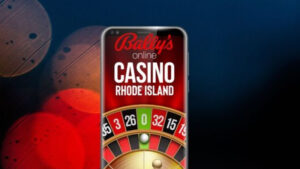
Rhode Island has become the seventh state to launch an online casino market with the opening of Bally’s online casino on Tuesday. The new Rhode Island online casinos market will, […]
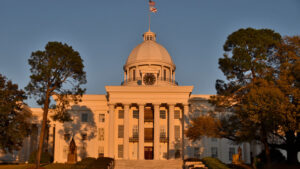
The gambling bill that aimed to put a comprehensive Alabama gambling law reform proposal before voters in November has stalled in the state Senate this week. HB151 and 152 call […]

Nevada’s January gambling revenues fell significantly on December 2023’s numbers. But operators still (just) hit a new record for the first month of the year. In total, all the Nevada […]
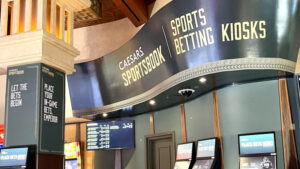
Eight North Carolina online sports betting operators are getting ready to launch on March 11. But one sportsbook has been able to jump the gun and make a limited launch […]

The Senator behind the recent — and most likely failed push to legalize online casinos in New York– has set up an open online meeting to discuss gambling addiction and […]
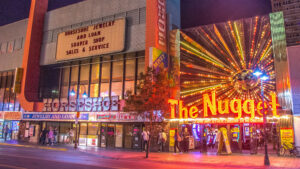
In a recent piece on the long-debated issue of online casino market cannibilization in the U.S, we discussed the demographic differences between physical casino customers and online gamblers. One thing […]

Caesars Digital, the online gambling arm of Nevada-based Caesars Entertainment, has signed two partnerships this week to expand its brand. The two deals will enhance its live dealer casino offering […]
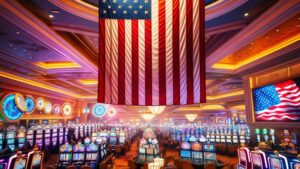
The U.S. commercial gambling business (excluding tribal casinos and state lotteries) reached a third straight record year of revenues in 2023. That’s according to the newly-released 2023 report from leading […]
Are you ready to take your online gambling experience to the next level? Sign up for the LetsGambleUSA newsletter and get the latest news, exclusive offers, and expert tips delivered straight to your inbox.